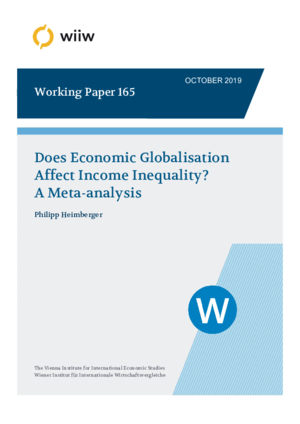Does Economic Globalisation Affect Income Inequality? A Meta-analysis
wiiw Working Paper No. 165, October 2019
56 pages including 6 Tables and 2 Figures
A large volume of econometric literature has studied the impact of economic globalisation on income inequality around the world. However, reported econometric estimates vary substantially which makes it difficult to draw valid conclusions. This paper presents a quantitative summary and analysis of existing estimates regarding the globalisation-inequality relationship. We used a new data set consisting of 1254 observations from 123 peer-reviewed papers. By applying meta-analysis and meta-regression methods, we obtained several main findings. First, globalisation has a (small-to-moderate) positive impact on income inequality considering the total population of estimates. The average effect is robustly different from zero suggesting that globalisation increases income inequality. Second, while the effect of trade globalisation is small, financial globalisation shows a more sizable and significantly stronger inequality-increasing impact. Third, the cumulative evidence rejects theoretical accounts according to which economic globalisation reduces within-country income inequality in developing countries as the meta-analysis establishes an average inequality-increasing impact in both advanced and developing countries. Fourth, education and technology moderate the impact of globalisation on income inequality. Fifth, we tested for various other factors that could cause heterogeneity in the reported estimates including differences in the econometric specifications, the income inequality measures and data set used and publication characteristics.
Disclaimer:
Funding from the Austrian Federal Ministry of Labour, Social Affairs, Health and Consumer Protection is gratefully acknowledged.
Keywords: Globalisation, trade openness, financial openness, income inequality, meta-analysis
JEL classification: D31, F6, O15
Countries covered: OECD
Research Areas: Macroeconomic Analysis and Policy, Labour, Migration and Income Distribution
